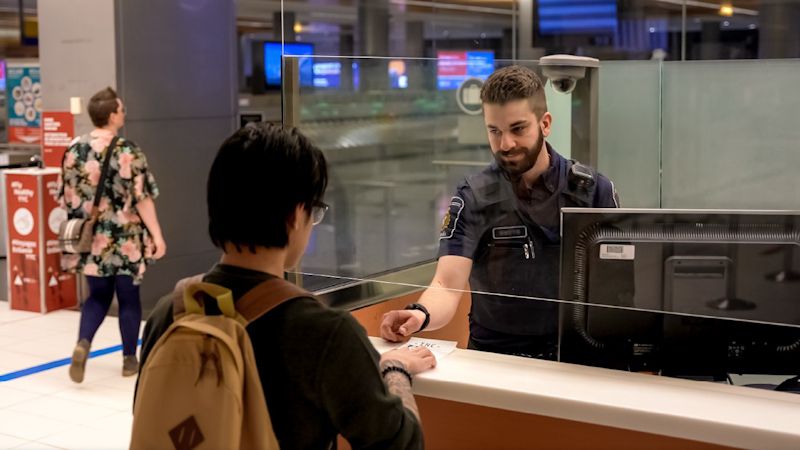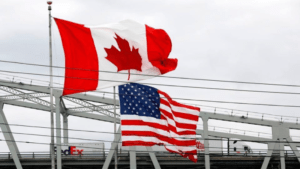
Travellers and travel advisors don’t have to worry about a strike by Canadian Border Services Agency workers. At least not on the weekend.
The Public Service Alliance of Canada, the union representing Canada Border Services Agency workers, had set a strike deadline of 4 p.m. Eastern Time on 07JUN. But it posted a notice on Twitter/X around 4:09 p.m. ET stating that mediation will continue for several days.
“URGENT UPDATE: All strike action by 9,000 CBDS personnel is on hold until Wednesday (12JUN). Picket lines will not be in place until further notice."
URGENT UPDATE: All strike action by 9,000 CBSA personnel is on hold as mediation will continue until Wednesday. Picket lines will not be in place until further notice.
Stand by for further details.
— PSAC-AFPC (@psac_afpc) June 7, 2024
“We’ve paused all strike action as talks continue to reach a fair contract for workers,” Sharon DeSousa, PSAC National President, said in a statement posted on the PSAC website. “Our members keep our borders moving, goods flowing and our families safe, and deserve a contract that delivers fair wages, equitable retirement and makes CBSA a better place to work."
New Deadline Coming Soon: Strike Could Still Happen
The union said all strike activities have been postponed as mediation continues into next week. But it also said a new strike deadline will be set in the coming days, and job action remains possible for CBSA workers if an agreement cannot be reached at the table.
“I’m hopeful we can reach a deal and avoid disruptions at Canada's borders,” said Mark Weber, Customs and Immigration Union National President. “Our members are essential – protecting our borders, preventing auto theft and stopping illegal drugs and firearms from entering Canada – and they deserve a fair contract that treats them with respect and dignity in line with other law enforcement agencies across the country.”
Union officials said they won't be providing media interviews during mediation.
The federal Treasury Board said it was pleased PSAC has committed to remaining in negotiations.
“To date, discussions have been productive, and we remain committed to reaching an agreement that is fair and reasonable for members of the Border Services group as quickly as possible,” the board said in a statement.
A delay, of course, doesn't mean there will be an agreement. But the union obviously felt reasonably good about the state of negotiations; or good enough that they didn't feel the need to walk off the job at 4 p.m.
More than 9,000 CBSA workers, out of a total of around 11,000, could ultimately be part of a job action should a strike occur, which could mean severe slowdowns at Canadian airports and border crossings.
PSAC officials said a strike could prove “very, very disruptive.”
“We are still hopeful that we can reach an agreement to avoid strike action and any potential delays at Canada’s borders," PSAC National President Sharon DeSousa said recently. “But the clock is ticking for Trudeau’s Liberal government to get to work on a fair contract for our members.”
Roughly 90% of border service workers are deemed essential employees and aren’t allowed to actually go on strike. However, they can take part in job action during their non-work hours, and the union says things could get messy at Canadian airports and border crossings.
Ottawa "Very Focused" on Potential Strike Impact
Earlier on 07JUN, Finance Minister Chrystia Freeland said the federal government is “very focused” on how the looming strike would impact the economy, Global News reports.
“It is something our government is very seized with. Very focused on. The parties are at the table working hard and our view is, the best deals are reached at the table,” Freeland told reporters when asked how a border strike could impact Canada’s economy.
The CBC notes that potential job action could include “work to rule,” when employees could conceivably apply each and every one of their job’s rules and regulations.
"You can create tremendous lineups of those trucks and tremendous lineups of people,” said Ian Lee, an associate professor at the Sprott School of Business at Ottawa's Carleton University. “It'll be very, very disruptive if they do work-to-rule because so many people cross that border every day.”
The CBC also reports that the Treasury Board of Canada Secretariat said that, under the Federal Public Sector Labour Relations Act, employees who are deemed essential must provide uninterrupted service and "cannot intentionally slow down border processing."
Tourism Could Take Big Hit
Claire Fan, an economist with the Royal Bank of Canada, said in an interview with CTV's News Channel on 06JUN that she expects the potential strike to have a spillover impact. Fan said auto manufacturers could see the biggest economic hit. Tourism and restaurants could also be hurt if travellers call off their trips as the travel season starts to ramp up.
“The clock is ticking for this matter to be resolved before our border crossings are severely disrupted and the billions of dollars of trade that flows through those border points are interrupted,” the Canadian Trucking Alliance warned on its website. “Delayed border crossings will reduce production in key employment industries, like the auto sector and others that rely on just-in-time goods deliveries, threatening the livelihood of thousands of Canadians.”
“PSAC members in the FB bargaining group have been without a contract for over two years,” PSAC states on its website. “Key issues in this round of bargaining include fair wages that are aligned with other law enforcement agencies across the country, flexible telework and remote work options, equitable retirement benefits for CBSA law enforcement personnel and stronger workplace protections.
“Job action by CBSA personnel in 2021 nearly brought commercial cross-border traffic to a standstill, causing major delays at airports and borders across the country and a marathon 36-hour bargaining session to reach an agreement,” PSAC said.
For now, worried travellers will just have to wait to see if history repeats itself.






